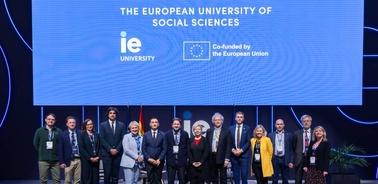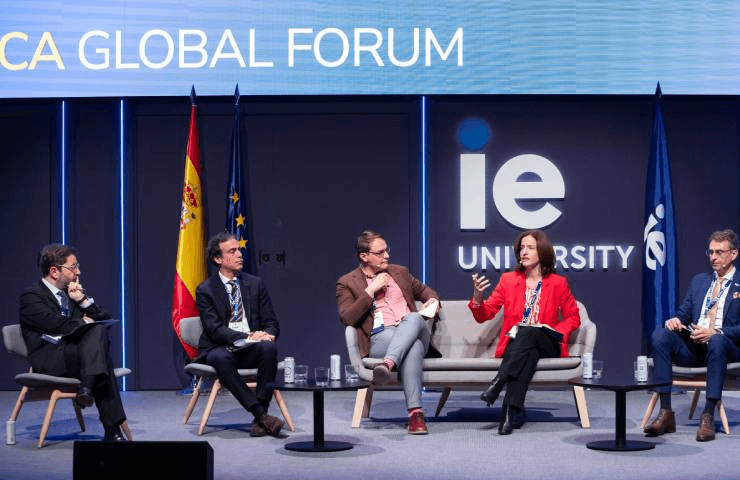- Home
- Civica
- Civica News
- Civica Global Forum Concludes With A Call For Interdisciplinary Action On Global Challenges
CIVICA Global Forum concludes with a Call for Interdisciplinary Action on Global Challenges

Held at IE University in Madrid, the CIVICA Global Forum brought together leaders and scholars to explore how the social sciences can be leveraged to tackle global challenges through research, education and policy engagement.
The CIVICA Global Forum 2025, hosted by IE University on 7–8 May in Madrid, convened leading voices from academia, policymaking and civil society to explore how interdisciplinary collaboration can provide solutions to today’s most pressing societal issues. With panels, workshops and keynotes across two days, the event reaffirmed the CIVICA university alliance’s role as a catalyst for innovation in European higher education.
Highlights from the event
The Forum kicked off with a striking call to action from Enrico Letta, former Prime Minister of Italy and Dean of the IE School of Politics, Economics and Global Affairs. In a powerful address, he urged Europe to embrace a ‘fifth freedom’: the free movement of research, innovation, knowledge and education. “Now is the time to raise our voices and the flag of the Fifth Freedom,” he said. “The future of Europe is in our hands. Let’s be bold enough to shape it.” Letta made a clear case for universities to be more than academic institutions. In his view, they are strategic actors in shaping a stronger, more united Europe.

Cornelia Woll, President of the Hertie School, reinforced this shared sense of purpose, stating that, as CIVICA universities, “our aim is to create and produce knowledge and education for public life; and to make the world a better place. We share in our alliance, a belief that you can do that with the social sciences.” Carsten Q. Schneider, Interim President and Rector of Central European University, emphasised the vital role of universities in protecting democracy: “To remain relevant and resilient, universities need to return to what they are good at: to teach, to research, to disseminate and to foster good citizens for open democratic societies.” This commitment to core academic values was complemented by a strong defence of intellectual freedom. Jeremy Perelman, Vice President for International Affairs at Sciences Po, affirmed: “We have to remember that scientific knowledge is a bottom-up operation. A lot of new discoveries, critical inquiry, new questions, would not have been found if there was not a space for open and free inquiry.”
This theme carried through a later session that explored how the integration of social sciences with STEM subjects is essential to preparing future changemakers. Rather than staying in silos, students need to understand both data and society, both code and context.
The closing keynote by European Commissioner Glenn Micallef brought the forum full circle, emphasising the role of youth, intergenerational fairness and cultural innovation in shaping Europe’s future. He reminded participants that Europe is more than a market and that social sciences have always been central to its identity. Calling for bold leadership from universities and echoing Enrico Letta, Micallef urged “European University Alliances must become key reference points for higher education. It is time to raise the flag for the fifth freedom; the free movement of knowledge, research and education”.
Across the two days, speakers returned to a shared ambition: to make education not just reactive to global challenges, but a driving force in solving them.
Broader Significance
In an era defined by global challenges, instability and rapid technological change, higher education institutions hold a unique and powerful position. As hubs of knowledge creation, innovation and leadership development, universities are not just observers of global issues; they are critical actors in the quest to solve them. The CIVICA Global Forum highlighted the importance of equipping students and researchers with the analytical tools, ethical awareness and interdisciplinary approaches needed to meet today’s challenges. As sessions throughout the event made clear, the social sciences are essential for understanding and shaping the systems (economic, political and technological) that define our world.
About CIVICA
As a European University Alliance focused on the social sciences, CIVICA is especially well placed to tackle today’s complex challenges and explore new opportunities. By combining strong research, innovative teaching, and public engagement, CIVICA brings together diverse perspectives and tools, both traditional and new, to better understand and shape the world we live in. As the forum demonstrated, CIVICA’s collaborative model is not only timely but essential to supporting the progress of higher education and research in Europe and beyond.
CIVICA unites ten leading European higher education institutions, with a total of 72,000 students & PhDs and 13,000 academic staff.